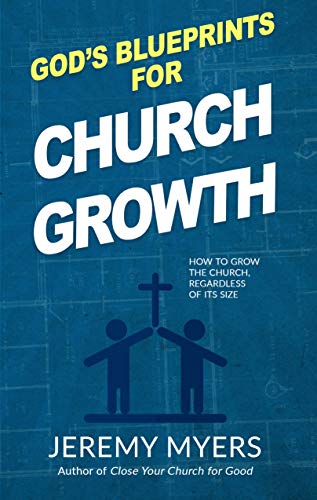Note: This study is from my book, (#AmazonAdLink) God’s Blueprints for Church Growth.
The Crew
… for the equipping of the saints for the work of service, to the building up of the body of Christ.
Ephesians 4:12
John F. Kennedy once told our nation, “Ask not what your country can do for you. Ask what you can do for your country.” And for a while, we followed his advice. But consumerism’s viselike grip upon our lives has us once more asking, “What will the government do for me?” According to the Christian philosopher Francis Schaeffer, this me-first, entitlement mentality is the type of thinking that led to the downfall of the Roman Empire.[1] If things continue as they are, this attitude will lead to our downfall as well.
But before that happens, this same mindset will lead to the downfall of the church. Most Christians come to church with the same consumer mentality that motivates them in the rest of life. “What does this church … or that church have to offer me? Whichever one offers to meet my needs, I will go there.” Even the term “Church Service” no longer means, “A place where I can serve” but rather, “A place where I am served.” (See my book, (#AmazonAdLink) Put Service Back into the Church Service).
Pastors and churches that want to be large often cater to this mentality. They give up biblical preaching. They only speak to felt needs. They rarely talk about sin, judgment, the marriage of Christianity and politics, or anything that might make a person feel uncomfortable. Since people do not seem to come to church to get what they really need, many churches have started to offer what people think they want.
Yet nationally, church numbers are still shrinking. Why? Because God did not design His church to be a place that focuses primarily on meeting felt needs. God wants us to meet needs that most people do not even know they have. For unbelievers, their greatest spiritual need is to hear that God loves them, forgives them, and thinks nothing but good about them. They need to hear that they can have eternal life and a relationship with God simply by believing in Jesus. And one of the best ways for the church to share this message of God’s love and acceptance is to show it to them.
The church is the hands, feet, and voice of God, and people primarily learn about God’s love for them by how the church functions in this world.
But the church also has another function, and that is to teach and train those who believe in Jesus. God designed His church as a place where all believers can be taught God’s Word and be given opportunities to put it into practice.
The Great Commission in Matthew 28:19-20 commands us to make disciples—not just converts. So the primary functions of the church are to invite unbelievers to believe in Jesus for eternal life, and then to invite believers to follow Jesus in this life. This entire process is called “salvation” in the Bible, and it is not just about how to go to heaven when you die, but also how to serve God and others while you live on earth. The church must tell people how to be saved so that they can serve.
This understanding is critical for the life, health, and future of the church. If we want to get back to being a victorious, life-changing church, each and every person within the church needs to begin by asking, in the words of John F. Kennedy, not what your church can do for you, but what you can do for your church.
And that is exactly what Ephesians 4:12 calls us to do.
As we look at God’s Blueprints for Church Growth in Ephesians 4:11-16, we have seen that on the construction site that is Christ’s Church, there are four Foremen who oversee the building site. The first two Foremen, the apostles and prophets, led the way in centuries past by writing Scripture. They laid the foundation according to Ephesians 2:20. The third Foreman is made up of all those who have the gift of evangelism. Evangelists speak the Scriptures with power to those who have not heard. As these people believe in Jesus Christ alone for eternal life, they become part of the church structure—they become what we could term the walls and the roof of God’s church. And then we learned that the pastor/teachers are responsible for providing light and heat to the church. They do this by speaking the Word of God to Christians, thereby training Christians not just to know the Word of God, but to apply it to their lives.
In Ephesians 4:12, we learn specifically what the pastor/teachers train the church members to do on the Construction site. If Ephesians 4:11 listed the Foremen, Ephesians 4:12 talks about the Crew. It says that God has provided the Foremen for the equipping of the saints for the work of ministry, for the edifying of the body of Christ.
The first part of Ephesians 4:12 shows us that the Foremen are to do one thing, and one thing only. They are to equip the saints.
The rest of Ephesians 4:12 indicates what the saints are supposed to do.
The KJV has caused much confusion in this area because of an unfortunate comma inserted after the word “saints.” It reads For the perfecting of the saints, for the work of the ministry, for the edifying of the body of Christ. When read this way, it appears that the Foremen are to do all three things mentioned in Ephesians 4:12.
The Foremen are to:
(1) equip the saints,
(2) do the work of the ministry, and
(3) edify the body of Christ.
With this comma placement, many Christians think that everything is the responsibility of the Evangelists and Pastors/Teachers. Those who happen to not be an Evangelist or Pastor/Teacher believe they can come to church and just soak up all the teaching and worship. So they sit back, relax, and enjoy the show. They adopt a “Here I am; Serve me” mentality.” They let others do the work of the ministry. After all, “the ministry” is what the pastor gets paid to do. As people adopt this mentality, the church begins to look like a football game—50,000 onlookers in the stands desperately in need of exercise, watching twenty-two people on the field who desperately need rest. All of this is the result of a misplaced comma.
 But with the comma removed (punctuation is not part of the inspired text, but a simple grammatical diagram of the Greek shows that the comma should not be there) we see that the Foremen have only one task, and the Crew have two. When we remove the comma, as it should be grammatically, we get a much different picture. Visually, the verse layout now looks like this:
But with the comma removed (punctuation is not part of the inspired text, but a simple grammatical diagram of the Greek shows that the comma should not be there) we see that the Foremen have only one task, and the Crew have two. When we remove the comma, as it should be grammatically, we get a much different picture. Visually, the verse layout now looks like this:
The Foremen are to equip the saints to:
(1) do the work of the ministry and
(2) edify the body of Christ.
This is different, isn’t it? The comma determines whose job is it to do the work of the ministry. When the comma is left in, all the work of the ministry belongs to the Foremen. But when taken out, the work of the ministry belongs to all the saints, leaving the Foremen to simply equip them to do it. For the Pastor/Teacher, this is quite a relief!
The Task of the Foremen
Ephesians 4:12 shows that God has provided Foremen for the equipping of the saints. The word equipping means to train, to prepare, to restore, to make fully ready. Equipping is basically just providing the tools and training that the crew needs for the job. And just like on any construction site, God has given us the necessary tools for the job.
There are a wide variety of tools, but all tools can basically be boiled down into three categories: tools that cut (saws and drills), tools that connect (nail and hammer, screwdriver and screw, glue, and every man’s secret weapon, duct tape) and tools that cover (caulking, mud, wood putty). For the church, these same tools are present in the preaching of the Word (cut), praying to God (connect) and fellowshipping with other believers (cover).
Cut
Cutting is done by the teaching and preaching of the Word of God. Often times in Scripture, God’s Word spoken “cuts to the heart” (Acts 2:37; Heb 4:12). Sometimes the cutting is painful when things we are quite attached to must be cut off and removed. But other times, the cutting is a relief and a joy as deadweight is removed and burdens are lifted.
Connect
We connect with God through prayer. Prayer is the glue that keeps us in close contact with God. It attaches us to God as we communicate with Him. It helps us remain in constant fellowship. As we pray, God conforms our thoughts and desires to His will so that the more time we spend in prayer, the more like Christ we live. Prayer connects us with God in a way that nothing else can because spiritual intimacy is born when we pray.
Cover
Fellowship among Christians allows us to get to know one another and develop loving relationships with one another. As we do this, we learn to love another. And love covers a multitude of sins (1 Pet 4:8). As we spend time with each other, we forgive one another, and bear one another’s burdens and fulfill all of the “one another’s” of Scripture.
Does your church make these tools top priority? To be properly equipped, you must make sure that you have tools that cut, connect, and cover. An equipping church makes sure that they are teaching the Word of God, praying to God, and fellowshipping with one another. Incidentally, these are the three things the early church focused on (Acts 2:42)[3] and was one of the keys to their power and effectiveness. Churches can do a lot of things, but if these three are not provided then the church is just spinning its wheels and will not get anything done.
If a church is struggling, the first thing pastors and church leaders should do is determine whether they are adequately teaching the Word of God, providing times for prayer and getting the church together for fellowship. Where one or more of these are absent, you will find a church that is either struggling to survive or is built on the power and ideas of man rather than God.
Once the Foremen have adequately equipped the Crew, the church is then ready to send the Crew out to work. But what is it that the Crew does?

The Tasks of the Crew
On a construction site, it is not enough to have the best-trained work crew if they don’t do any work. They may have the necessary knowledge and all the best tools and resources, but if they don’t do any work, there will not be any progress on the building.
When I lived in Chicago, there was a joke among some of my friends that Chicago only had two seasons—winter and construction. It seemed like the construction crews were always doing some project, but they never got any work done. This was especially true of the road repair crews. I remember one crew that went to work at first light every morning right outside my dormitory window for about two months. I was greeted at dawn every morning with the sound of jack hammers, concrete saws, and yelling voices for two whole months. Every morning I looked out my window to see if I could discover what they were doing. I never did figure it out. They worked for about two months on the same twenty foot stretch of pavement. When they were finally done, it looked exactly as it had before.
Many of our churches are like this. They make a lot of noise, cause a lot of commotion, but when all is said and done, not a whole lot gets accomplished. This is because, in many cases, the Crew does not know what they are supposed to be doing. Ephesians 4:12 clears this up by assigning two tasks to the crew.
The crew is to do the work of the ministry and edify the body of Christ.
The Work of Ministry
The first task of the Crew, after they have been equipped and trained by the Foremen, is to do the work of ministry. This is backwards from how most people view the church structure today. Most of us think that the pastors are hired as “the ministers” and they are the ones who are in “full time ministry.” But Paul turns all of that upside down. The ministry of the church leaders is to teach and train the Christians within the church to be the ministers. On a construction site, it is not the Foremen who do most of the work, but the Crew. This should also be the case in the church.
While God has given the Foremen three basic tools to equip the saints, He has also given a special tool set to each Christian to be used for ministry and mutual edification in the local church. These tools may be helpful in secular endeavors, but are not given primarily for this purpose. Rick Warren, in his national best-selling book, The Purpose Driven Life, points out that God has shaped us for service. He uses the word SHAPE as an acronym to describe the five things that make each of us unique for our God-given ministry.[4] They are your
Spiritual Gifts
Heart
Abilities
Personality
Experiences
Let us briefly consider each.
Spiritual Gifts
A gift is something specifically given to you by somebody else. Biblically, we think of these as Spiritual gifts, and they are given to Christians by God at the moment we first believe in Jesus Christ for eternal life. Some people are given only one; others are given multiple gifts. There is a debate among Christians about which gifts there are, how many there are, and which ones are still in use today. There is also a debate on how to discover your spiritual gifts. See (#AmazonAdLink) my book on the Spiritual Gifts for more about how to discover and use your spiritual gifts.
Heart
The heart is where your desires are. The heart contains your dreams and plans for your future. You discover your heart by asking the question, “If I could do anything in life, what would it be?” When you stop and think about this, you are searching for your heart. Frequently, these desires were placed there by God. The Bible says that He will give you the desires of your heart (Ps 37:4). This means both that He has placed them there, and that if you chase after them as He intends, He will bring them to fruition.
Certain forms of Christianity have told us that our desires are evil and sinful. But if we want to follow Jesus and serve God with our lives, and be used in His Kingdom, then our desires are God-given and should be sought after and worked for.[5] Certainly, there are still evil desires within us, but the solution to overcoming them is not to get rid of all desire, but rather, to discern between desires. There is the finest of lines between the greatest of sinners and the greatest of saints. We think they are on opposite ends of the spectrum, but in reality, they are both at the pinnacle of desire. One, however, reaches for the attainment of all his fleshly desires, the other reaches for the attainment of all the spiritual desires. “Desire, a burning passion for more, is at the heart of both … the greatest enemy of holiness is not passion; it is apathy.”[6] What are your desires telling you about your heart?
Abilities
Alongside Spiritual gifts and our God given desires, each of us have abilities and talents. Everybody has these, both Christians and non-Christians. Sometimes these abilities are natural—we are born with them; other times they are acquired—we learn them through education or an apprenticeship.
Often, these abilities and talents are used by business men and women to succeed in their jobs. Some who have a good head for math become excellent scientists and engineers. People with a love for music might become musicians. Those with good people skills do well in management or sales. We all have abilities that make us better at some things than others. Rick Warren says that on average, you possess from 500 to 700 different abilities![7] As we learn of these various abilities, they will help us know more about the particular features of our SHAPE.
Personality
Many of us like to classify personalities. We talk about “Type A” personalities. We take personality assessments. We talk about the four personality types. Sometimes we think that some personalities are better suited for ministry than others, or that certain personalities are ministry handicaps. But the fact is that there is no right or wrong personality for ministry. God made you who you are, and you need to understand that so that you can be who He made you to be in whatever ministry He calls you to do. There is nothing more frustrating than trying to serve God when you act like somebody else. If we try to serve God in areas that require gifts we do not have, the experience is quite frustrating. Be yourself because it is you that God wants; not you acting like someone else.
Experiences
Finally, every single person has a unique life experience. Some people have gone through unimaginable horrors. Others have lived a life of ease and luxury. There are many who wallowed in the depths of depravity, while others lived morally upright lives. Some people experience the loss of a loved one. Some experience daily pain and sickness. Nobody, however, just has an “ordinary” life. There is no such thing. We all have some things in common, but every person has a unique set of life experiences.
God can use these experiences—even the painful ones—to teach and show you the things He wants you to know. These experiences will help you relate with others who have gone through similar experiences. So do not deny them or try to hide them. When you are honest and open about the valleys, mountains and potholes of your life, others who have gone through similar experiences will see and will join you.

Putting the Five Together for Ministry
It is the first task of the saints to do the work of the ministry. But in order to know what ministry they should be doing, every saint should understand their SHAPE. The combination of these five things will help you understand what sort of ministry you would be good at. The combinations and applications are infinite. Your spiritual gifts, plus the desires of your heart, in combination with the abilities and skills you have learned, added to the personality you have developed and the experiences in life you have gone through make you absolutely unique for a certain ministry. If you don’t do what God has prepared you to do, nobody else will.
Maybe you have the gifts of teaching and service, you were raised in a good family, and you have a lot of knowledge and experience in childhood development. In that case, maybe God’s will for you is for you to help other young mothers within and without the church to raise their own children in a Godly fashion.
I know of a man who had the spiritual gifts of evangelism, service, and creative communication, the heart desire to travel and be on the open road, the ability and knowledge to work on motorcycles, a fun-loving and free-spirited personality, and the life experiences of riding motorcycles. He came complete with the tattoos and scraggly beard. This SHAPE made him perfect to start a ministry to Harley riders. And God is using him greatly to fulfill this ministry.
This is also one of the reasons I currently help pastors, authors, and other Christians build websites and their online presence. I have the spiritual gifts of pastor/teacher, and also the experience and abilities of web development and coding, and the heart to coach and help others get their God-given message out into the world, and so I want to help others get their own websites up and running as well.
As each and every saint discovers their spiritual gifts, heart, abilities, personality and life experiences, it will become clear to them and to others what sort of ministry God has prepared for them to do (Ephesians 2:10). It may be unique. It may sound crazy to others. But if God has prepared good works especially for you to do, you need to do them, because nobody else will.
Pastor/Teachers sometimes find that a person knows what they need to do without knowing what their spiritual gifts, abilities or experiences even are. The way this happens is that they often come to the office after the church service, or sometime during the week, and say something like, “You know what this church really needs to do? We need to set up a skate park for all the skaters in town. I was walking downtown yesterday, and noticed signs up all over the place saying, ‘No Skateboarding.’ What if we built a skate park, and put up signs that said, ‘Yes, Skateboarding!’ Can you get started on it right away, Pastor?”
These kinds of “helpful ideas” normally destroy a pastor. He usually tries to sound positive and encouraging, but inside, he is thinking, “Oh no! Not another criticism of what the church should really be doing. I’m swamped as it is. I can’t take on another project.”
When I was a pastor, this used to frustrate me as well. But then I realized that when people came to me with ideas for what we should be doing as a church, these ideas were probably valid, but they were not ideas for new areas of ministry that I should be leading, but ideas for new areas of ministry that should be led by the person who was coming to me with the idea.
Once I realized this, I first affirmed their sensitivity to what God wants His church to be doing. I would say something like, “That’s a great idea! God is really showing you what He wants this church to do. And I really liked your ideas and the suggestions on how it could be done.” I might even show them from the Bible that their ideas are also God’s ideas.
Then I told them that their ideas reveal the way God had wired them. I let them know that God had given them spiritual gifts, and these gifts help them see areas of need in the church, and ministries which the church was lacking. I let them know this is why they saw this need when many other people had missed it. If I was able, I told them what their spiritual gifts might be. If a man said the church needed to reach out more to the community through acts of service, there was a good possibility that man has gifts of evangelism, service, and mercy. If a lady wanted to see more emphasis on prayer, she might have the gift of intercession.
Thirdly, I laid down a challenge. I tell them that God did not give spiritual gifts just to point out weaknesses in the church. He gave the gifts to fill these weaknesses. Seeing the weakness is simply the Holy Spirit working on the individual to find a ministry in the church. When they tell me what the church should be doing, what they were really seeing was something that God wanted them to do. So I told them to change “Somebody else should …” to “God wants me to …”
Frequently, some people just like to come up with ideas, but not really do anything. So I like to see how serious they are. I ask them to put together a plan, or find someone in the church who will come on board and help them put together a plan for this ministry (After all, this person might not be an organizer/administrator).
Then I left it up to them. I did not shoved them off into a dark corner. I didn’t quenched their desire to serve. Instead, I encouraged them in what may be God’s guidance, and I gave them an opportunity to get their ministry started. If they wanted further guidance or ideas, I made myself available. I wanted to teach and train them to do what God called them to do rather than simply do their ministry for them. In this way, they become the ministers. And when they ministered in such a way, they accomplish the second task of the Crew—the edification of the body.

The Edifying of the Body of Christ
Each person is to minister to others for the purpose of edifying of the body of Christ. While the ultimate goal of all service is to bring glory to God, this is the method by which it is achieved. Each person needs to use their SHAPE for the mutual edification of the other members of the body of Christ.
Edification really isn’t a word we use much anymore. It means strengthening, encouraging. In construction terms, it means building up. As the Bible defines it, true church growth is caused by the mutual edification of the believers. The growth of the body of Christ is caused by people using their gifts to edify, or build up, one another. If you want the church to grow, you need to be asking yourself “What has God called me to do so that I can edify others?”
Jesus Christ has specially gifted you to do exactly what He wants you to do. It is not just that He has a will for your life, it is that He has given you the set of tools you need to do what only you can do. Think of yourselves as having a monopoly on what it is Jesus wants you to do.
Imagine how impossible it would be to get your teeth cleaned if there were only one dentist in town. Not only would he always be busy, but he could also charge whatever he wanted for his services. Worse than this, imagine if this dentist refused to work on anyone’s teeth! What if he got tired of people always coming to him with their toothaches, and the teeth they hadn’t brushed or flossed properly? What if he got fed up with it all, and just said, “No more! I’m not going to work on anyone else’s teeth!” What would happen? Two things would happen. He would eventually go bankrupt and everybody else’s teeth would rot.
That’s the way it is when a person either doesn’t realize what their spiritual gifts are, or refuses to use them. Since we are all unique in our SHAPE, it is as if every person is the only dentist in town. Every person has a monopoly on what they offer. If people don’t know what their SHAPE is, or if they refuse to use their gifts, then not only will they become spiritually bankrupt, but everybody else will rot their spiritual teeth. Each person is unique in what they can offer, and when they fail or refuse to offer it, everybody loses.
This is so important to understand. What God desires for you, and what He has gifted you to do, no one else can do! Yes, others may have the same gifts, but no one else has your God-given personality; no one else has your history or your experiences that can put a particular perspective on what you are doing for God. In other words, no one can do what you do better than you. In Christ, you are unique. You have a monopoly on what God has given you.
So what are you going to do with it? God will not force you to obey Him. He will not force you to do His will. But again, if you refuse, you are the one missing out—and so is everyone who needs what you have. And when too many people neglect what they are supposed to do—people and organizations start dying.

This happened to one small community church. It was the only church in town, but the people who attended never got involved, so the pastor had to do it all. One after another, pastor after pastor got burned out and left. Year after year, the church became smaller and smaller.
The church gained quite a reputation. After a while no pastor wanted to take the church. Finally, a young pastor agreed to come. On his first Sunday, he announced to the eight people who attended that on the following Sunday they were going to have a funeral service for the church. The church had died, and they were going to bury it.
He let the local newspaper know so they could run an obituary. The newspaper thought it was newsworthy enough to put it on the front page.
The following Sunday, enough interest had been sparked, that almost the whole community showed up for the funeral service. They wanted to see what a funeral service for a church looked like. As the people entered the building, there was soft funeral music playing. In the front of the sanctuary was a casket surrounded by flowers and soft lighting. The pastor sat up front dressed all in black.
When the room was packed to overflowing, he stood up to welcome the people, and then spoke a short eulogy over the casket about the dead church. He then told the audience that as it was an open-casket funeral, they would each be allowed, one by one, to come and look into the casket to pay their last respects.
So, one by one, each person came forward—out of morbid curiosity—to look into the open casket. And each one, after glancing in, turned quickly away and walked sheepishly back to their seat.
What was in the casket for the dead church? Nothing but a mirror. As each person looked into the casket, they saw their own face staring back at them. Had the church died? Yes, it had. Why? Because the people no longer did the work of the ministry that God had called them to do.
God has given you something to do which only you can do, and if you do not do it, it will not get done, and the church will be worse off as a result. Jesus Christ has a plan to build His church, and you are in it. Will you follow the directions, or will you fall through the cracks? Because you are a saint, you are a minister. You are part of the Crew. And as a minister in this Crew, you need a ministry, a place of service.
Ask not what the church can do for you, but what you can do for the church.
NOTES:
[1] Francis Schaeffer, (#AmazonAdLink) How Should We Then Live? (Wheaton: Crossway, 1976), 227. He is summarizing Edward Gibbon’s (#AmazonAdLink) Decline and Fall of the Roman Empire. There are five stages of decline. The fifth and final is an increasing desire to live off the state. In other words, “What can the government do for me?”
[3] I take the breaking of bread from house to house to be part of the fellowship. It simply refers to going over to each’s houses to eat a meal and hang out.
[4] Rick Warren, (#AmazonAdLink) The Purpose Driven Church (Grand Rapids: Zondervan, 2002), 236-248.
[5] Cf. John Eldredge, (#AmazonAdLink) The Journey of Desire (Nashville: Thomas Nelson, 2000).
[6] Ibid, 53-54.
[7] Warren, 242.






 But where did this list come from? It seems to have been cherry-picked from various verses in the Bible. Why are these often the types of good works people look for in others? Because these are the types of good works that pastors and church leaders want in the people who attend their church.
But where did this list come from? It seems to have been cherry-picked from various verses in the Bible. Why are these often the types of good works people look for in others? Because these are the types of good works that pastors and church leaders want in the people who attend their church.


 But I have recently encountered a big problem on this blog: Blogging starts to get expensive. Very expensive.
But I have recently encountered a big problem on this blog: Blogging starts to get expensive. Very expensive.


 Arthur Sido recently brought to my attention that in 2014,
Arthur Sido recently brought to my attention that in 2014, 
 Who are the homeless? What are they thinking as we walk by without looking them in the eye? What do they want from us as they hold their sign at the stoplight while we fiddle with the radio knobs on our car dashboard?
Who are the homeless? What are they thinking as we walk by without looking them in the eye? What do they want from us as they hold their sign at the stoplight while we fiddle with the radio knobs on our car dashboard? 
 A group of about twenty angry homeless men are milling around. One police cruiser with one policeman inside backed into place in the middle of the street in front of them. The policeman rolled down his window, then opened his door, got out and stood there, facing off with the men.
A group of about twenty angry homeless men are milling around. One police cruiser with one policeman inside backed into place in the middle of the street in front of them. The policeman rolled down his window, then opened his door, got out and stood there, facing off with the men.